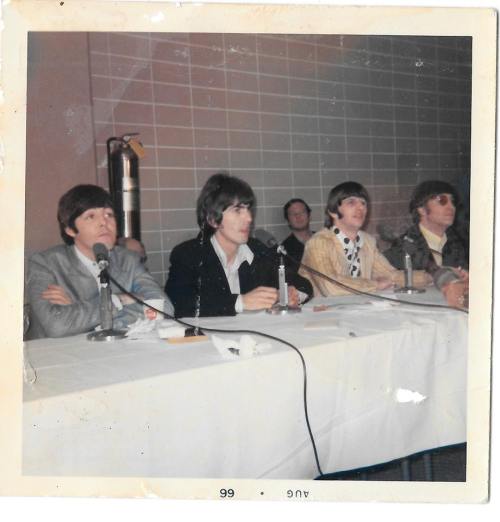
Beatles press conference in Memphis, August 19, 1966
www.commercialappeal.com
How much would the Beatles love us now?
David Waters
Columnist
24th August 2016

The Beatles performed at 4 and 8:30 p.m. at the Mid-South Coliseum in Memphis, Friday, August 19, 1966. The Commercial Appeal reported that 20,128 people "heard the Liverpudlians bow to Dixie." A total of 7,589 attended the afternoon show and 12,539 showed up at the evening concert. The Cyrkle, Bobby Hebb, The Ronettes and The Remains also were on the bill. Tickets cost $5.50. According to the newspaper, the Beatles — John Lennon, Paul McCartney, George Harrison and Ringo Starr — wore "modish-dull gray suits" for the afternoon show and "dark green creations with chartreuse shirts" for the evening concert. A chain-link fence surrounded the stage. Across town, a crowd of more than 8,000 filled the Auditorium North Hall and part of the South Hall for the Memphis Christian Youth Rally. This was provoked by Lennon's statement that the Beatles were more popular than Jesus Christ. (By Robert Williams / The Commercial Appeal)
The Memphis City Council might decriminalize small amounts of marijuana, and let the Mid-South Coliseum become a Wiseacre brewery.
Imagine what John Lennon, a bit of a wiseacre and a cannabis user, would think of us now.
Lennon was here 50 years ago this month with Paul McCartney, George Harrison and Ringo Starr.
On Aug. 19, 1966, the Beatles played back-to-back concerts at the sparkling 3-year-old Coliseum. Beer was not sold.
A few months earlier, Lennon had said the Beatles were "more popular than Jesus now."
At that point they were, at least among 14-year-old girls.
"My friends and I screamed all the way through," Sheila Jenkins of Tupelo told the Daily Journal last week. She attended both concerts. She was 14.
After the first concert, she wrote, "I screamed to Paul at the top of my lungs and he looked up directly at me and smiled, then waved — AT ME!"
During the third song of the second concert, some idiot fan set off a firecracker. It scared the bejesus out of Lennon and the other lads.
"There had been threats to shoot us, the Klan were burning Beatle records outside," Lennon wrote in 1974. "Somebody let off a firecracker and every one of us — I think it's on film — look at each other, because each thought it was the other that had been shot."
They were startled but they kept singing and playing "If I Needed Someone." Then they sang "Day Tripper," a song about recreational drug use and their fifth biggest hit ever.
Which brings us back to the future.
"I think responsible weed smokers smoke their joints at home," said council member Janis Fullilove.
That was her argument against the ordinance to decriminalize small amounts of marijuana possession.
Reminds me of a quote from Spinoza (the Dutch philosopher, not City Council member Philip Spinosa, who voted with a majority for the ordinance).
"Men of leisure are never deficient in the ingenuity needed to enable them to outwit laws framed to regulate things which cannot be entirely forbidden," Spinoza said.
That quote was part of a 1967 ad supporting the legalization of marijuana in Britain. "The law against marijuana is immoral in principle and unworkable in practice," the ad said.
The Beatles were among those who signed the ad.
"I hope the fans will take up meditation instead of drugs," said Ringo, the only Beatle never arrested on suspicion of possession.
The Beatles were paid $50,000 to play two shows at the Coliseum. That's about $186,000 per show in today's dollars.
The Rolling Stones made more than $8 million per concert on their most recent tour. Their tickets were over $300. Beatles tickets were $5.50 in 1966. That's about $40 in today's dollars.
Given the excesses of some of today's music stars, the Beatles, who became more popular than Elvis, were surprisingly low-maintenance.
In their Coliseum contract, they asked for a "seven-passenger Cadillac limousine (air-conditioned if possible) with chauffeurs."
They also asked for a dressing room with "four cots, mirrors, an ice cooler, portable TV set and clean towels and two (2) cases of soft drinks."
The contract had another condition: "Artists will not be required to perform before a segregated audience."
After the Beatles left Memphis, their attorney sent a letter on their behalf to Mayor William Ingram:
"The Beatles have asked me to express to you and the entire City Government ... their great admiration for the Coliseum itself."
Someone should put that on a plaque inside the new brewery.

The Beatles — Paul McCartney, George Harrison, Ringo Starr and John Lennon — in Memphis in 1966. They gave two performances at the Mid-South Coliseum on Aug. 19. More than 20,000 fans attended. The late Fred Griffith, former staff photographer for The Commercial Appeal, shot photos of the Beatles for the newspaper. In 1991, he said he and other members of the accredited press were allowed to take photos during the group's news conference at the Coliseum. Griffith, now recalled seeing the Beatles in the rear of the Coliseum before the news conference. "They were in the bus and leaning out the windows and yelling and hollering, and the girls were screaming." Griffith wasn't really impressed with the Beatles during the news conference. "They weren't all that friendly. As I remember it, they acted like they were so much better than any of us. They acted like we were wasting their time, I thought." (By Fred Griffith / The Commercial Appeal)

No hay comentarios:
Publicar un comentario